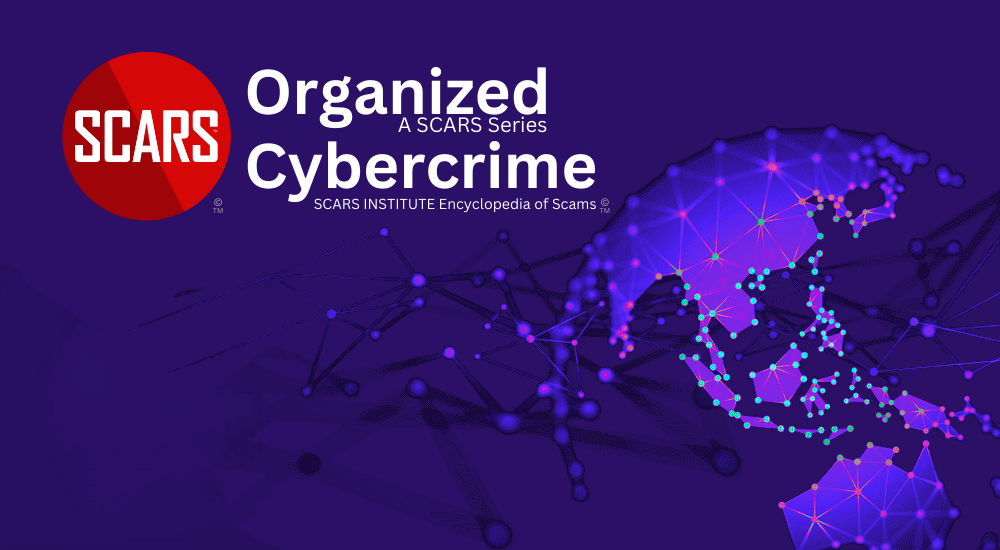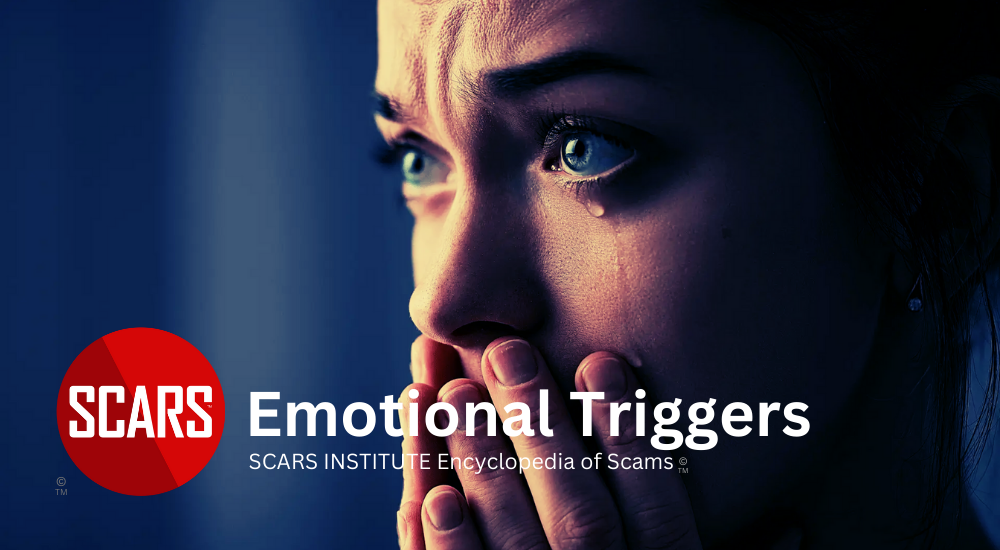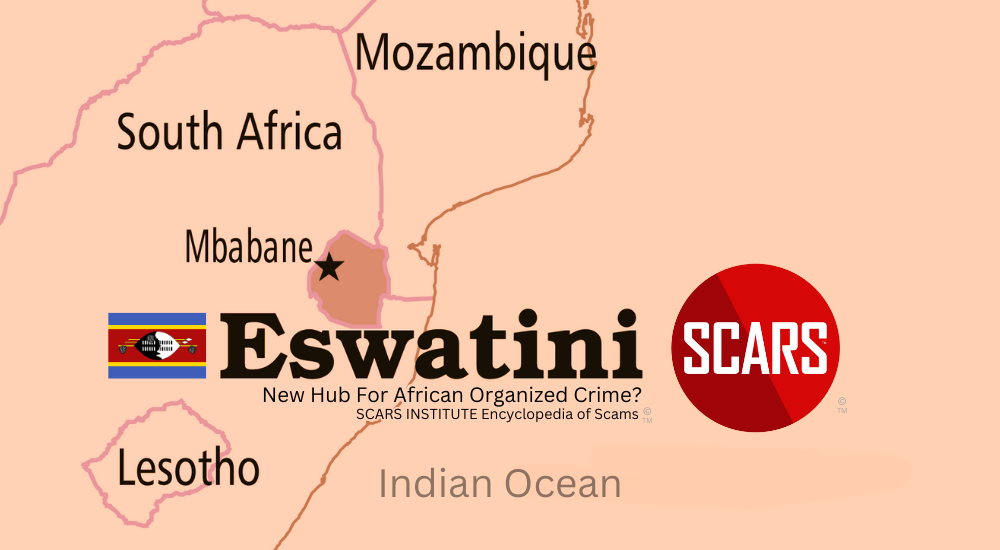
SCARS Institute’s Encyclopedia of Scams™ Published Continuously for 25 Years

Eswatini (Swaziland) – the Emerging Hub for African Organized Crime
A Tiny African Country Becomes a Big Organized Crime Problem
Criminology – A SCARS Insight
Author:
• SCARS Institute Encyclopedia of Scams Editorial Team – Society of Citizens Against Relationship Scams Inc.
Article Abstract
Eswatini, a small kingdom in Southern Africa, is increasingly becoming a significant hub for organized crime in Africa. The country’s weak regulatory oversight, high-level corruption, and strategic location have attracted international crime groups, including the Nigerian ‘Black Axe’ and Russian organized crime syndicates.
Eswatini is now a base for various illicit activities, such as drug trafficking, cybercrime, financial fraud, and gold smuggling. The involvement of Russian criminals, in particular, has been highlighted as they use Eswatini’s lax maritime regulations to bypass Western sanctions by registering ships there for criminal commerce.
This transformation poses serious challenges for the country’s law enforcement agencies, which struggle with limited resources and expertise. As Eswatini’s role in the global criminal economy grows, it threatens not only local stability but also the broader region, underscoring the need for international efforts to address these developments. Without significant reform and support, Eswatini risks becoming a central player in global organized crime.

Eswatini: Emerging as a New Hub for Organized Crime in Africa
In recent years, Eswatini, a small kingdom in Southern Africa, has drawn increasing attention from international law enforcement agencies and criminal organizations alike. The country is being increasingly recognized as a growing hub for organized crime in Africa, with connections to various illicit activities that span the globe. This shift has been driven by a combination of weak regulatory oversight, high-level corruption, and its strategic location in the region.
Eswatini Involvement in Organized Crime Networks
One of the most alarming developments is the presence of international organized crime groups, including the notorious Nigerian ‘Black Axe.’ Originally founded as a student fraternity, Black Axe has evolved into a powerful criminal organization involved in drug trafficking, human trafficking, and cybercrime. Eswatini has become an attractive base for such groups due to its porous borders and limited law enforcement capabilities. These criminal networks exploit the country’s weak regulatory environment to establish operations that can easily extend into neighboring countries like South Africa and Mozambique.
Cybercrimes in Eswatini
According to the Organized Crime Index:
Eswatini is vulnerable to cybercrimes because of a lack of public awareness of cyber-security. Cybercriminals target various sectors, financial institutions included, taking advantage of the increasing use of computers, smartphones, and the low public vigilance towards cyber-security. Consequently, there has been an increase in reported cybercrimes in recent years.
Financial crimes pose a significant problem in Eswatini, and online fraud is one of the most common forms of economic crime in the country. ATM fraud, card cloning, investment fraud, and internet fraud are among the most prevalent types of financial crimes, with banks frequently targeted or serving as intermediaries for victim compensation. Embezzlement of public funds is widespread, with high-profile officials, including members of Parliament and the military command, investigated for a range of financial crimes. In the private sector, fraud is an issue in real estate and on plantations. Corruption and tax evasion are other main forms of financial crime in Eswatini, with the proceeds believed to be invested in the relatively unregulated real estate sector. Although the banking sector handles most formal financial transactions, cash transactions and cross-border cash transportation drive a large informal economy. Despite the prevalence of financial crimes, the rate of these crimes in Eswatini is probably underreported.
Foreign actors in Eswatini mainly consist of small diasporas, with Asian and West African communities being the most prominent. They have connections with their counterparts in neighbouring countries and engage in a range of criminal activities, including smuggling drugs such as heroin and meth, and the cannabis trade. Additionally, there is evidence of foreign residents engaging in cross-border fraud and cybercrime targeting individuals and institutions in South Africa, with proceeds typically transferred out of Eswatini. Other foreign-led activities include the smuggling of commodities, contraband retail, and violent predatory crimes such as robberies. There is also evidence of foreign enterprises being involved in wildlife trade and money laundering.
This provides a breeding ground for criminals who prefer fraud over regular work.
However, SCARS has also observed the movement of Black Axe operatives that seem to be operating in Eswatini as well.
Russian Organized Crime and Sanctions Evasion
Compounding the situation, Russian organized crime groups have found a new way to bypass Western sanctions by exploiting Eswatini’s lax maritime regulations. With limited scrutiny and a lack of robust oversight, Eswatini has become a convenient jurisdiction for registering Russian ships. These vessels are then used for various forms of criminal commerce, including smuggling, illegal fishing, and trafficking of goods banned under international sanctions.
This exploitation of Eswatini’s maritime registry is particularly concerning because it allows Russian criminal organizations to maintain their operations despite global efforts to curtail their activities. By flying the Eswatini flag, these ships can navigate international waters with reduced scrutiny, facilitating illegal trade and money laundering on a significant scale.
Financial Crime and Gold Smuggling in Eswatini
Eswatini’s growing role in the regional and global criminal economy is further underscored by its involvement in gold smuggling operations. Investigations have revealed that illegal gold from South Africa is laundered through Eswatini before being exported to markets in the Middle East. This smuggling network reportedly involves influential figures within Eswatini, including those connected to the royal family, raising serious concerns about corruption at the highest levels of government.
These illicit financial flows are not limited to gold. The country is also becoming a hotspot for various financial crimes, including money laundering and tax evasion. The banking sector in Eswatini, despite being relatively small, is increasingly being used to facilitate these crimes, taking advantage of the country’s limited regulatory frameworks and enforcement capabilities.
Challenges for Law Enforcement
Eswatini’s law enforcement agencies face significant challenges in combating these sophisticated criminal networks. The Royal Eswatini Police Service, though formally responsible for national security, lacks the resources and expertise to effectively tackle the complex web of organized crime activities now taking root in the country. Moreover, the involvement of high-ranking officials in these illicit activities further hampers efforts to bring criminals to justice.
The situation is exacerbated by the country’s legal and regulatory environment, which is ill-equipped to deal with the scale and sophistication of international organized crime. Despite some efforts to strengthen anti-corruption measures and improve law enforcement capabilities, the pervasive influence of criminal organizations continues to undermine these initiatives.
Implications for the Region and Beyond
Eswatini’s transformation into a hub for organized crime has serious implications for the region and beyond. As criminal networks establish stronger footholds in the country, they not only threaten local stability but also contribute to a broader pattern of lawlessness and violence across Southern Africa. The use of Eswatini as a transit point for drugs, illegal gold, and other illicit goods increases the risk of crime and corruption spreading to neighboring countries.
Furthermore, the involvement of Russian organized crime in bypassing sanctions through Eswatini’s maritime registry poses a significant challenge to international efforts aimed at curbing illegal activities. This development highlights the need for a coordinated global response to address the growing influence of organized crime in Eswatini and to prevent the country from becoming a safe haven for criminal enterprises.
Conclusion
Eswatini’s emergence as a new hub for organized crime in Africa is a troubling development that demands urgent attention. The country’s strategic location, weak regulatory frameworks, and the involvement of powerful criminal networks create a perfect storm for illicit activities. Without significant international support and reform, Eswatini risks becoming a central player in the global criminal economy, with far-reaching consequences for the region and beyond.
-/ 30 /-
What do you think about this?
Please share your thoughts in a comment below!
Table of Contents
- A Tiny African Country Becomes a Big Organized Crime Problem
- Article Abstract
- Eswatini: Emerging as a New Hub for Organized Crime in Africa
- Eswatini Involvement in Organized Crime Networks
- Cybercrimes in Eswatini
- Russian Organized Crime and Sanctions Evasion
- Financial Crime and Gold Smuggling in Eswatini
- Challenges for Law Enforcement
- Implications for the Region and Beyond
- Conclusion
LEAVE A COMMENT?
Thank you for your comment. You may receive an email to follow up. We never share your data with marketers.
Recent Comments
On Other Articles
- on Love Bombing And How Romance Scam Victims Are Forced To Feel: “I was love bombed to the point that I would do just about anything for the scammer(s). I was told…” Feb 11, 14:24
- on Dani Daniels (Kira Lee Orsag): Another Scammer’s Favorite: “You provide a valuable service! I wish more people knew about it!” Feb 10, 15:05
- on Danielle Delaunay/Danielle Genevieve – Stolen Identity/Stolen Photos – Impersonation Victim UPDATED 2024: “We highly recommend that you simply turn away form the scam and scammers, and focus on the development of a…” Feb 4, 19:47
- on The Art Of Deception: The Fundamental Principals Of Successful Deceptions – 2024: “I experienced many of the deceptive tactics that romance scammers use. I was told various stories of hardship and why…” Feb 4, 15:27
- on Danielle Delaunay/Danielle Genevieve – Stolen Identity/Stolen Photos – Impersonation Victim UPDATED 2024: “Yes, I’m in that exact situation also. “Danielle” has seriously scammed me for 3 years now. “She” (he) doesn’t know…” Feb 4, 14:58
- on An Essay on Justice and Money Recovery – 2026: “you are so right I accidentally clicked on online justice I signed an agreement for 12k upfront but cd only…” Feb 3, 08:16
- on The SCARS Institute Top 50 Celebrity Impersonation Scams – 2025: “Quora has had visits from scammers pretending to be Keanu Reeves and Paul McCartney in 2025 and 2026.” Jan 27, 17:45
- on Scam Victims Should Limit Their Exposure To Scam News & Scammer Photos: “I used to look at scammers photos all the time; however, I don’t feel the need to do it anymore.…” Jan 26, 23:19
- on After A Scam, No One Can Tell You How You Will React: “This article was very informative, my scams happened 5 years ago; however, l do remember several of those emotions and/or…” Jan 23, 17:17
- on Situational Awareness and How Trauma Makes Scam Victims Less Safe – 2024: “I need to be more observant and I am practicing situational awareness. I’m saving this article to remind me of…” Jan 21, 22:55
ARTICLE META
Important Information for New Scam Victims
- Please visit www.ScamVictimsSupport.org – a SCARS Website for New Scam Victims & Sextortion Victims
- Enroll in FREE SCARS Scam Survivor’s School now at www.SCARSeducation.org
- Please visit www.ScamPsychology.org – to more fully understand the psychological concepts involved in scams and scam victim recovery
If you are looking for local trauma counselors please visit counseling.AgainstScams.org or join SCARS for our counseling/therapy benefit: membership.AgainstScams.org
If you need to speak with someone now, you can dial 988 or find phone numbers for crisis hotlines all around the world here: www.opencounseling.com/suicide-hotlines
A Note About Labeling!
We often use the term ‘scam victim’ in our articles, but this is a convenience to help those searching for information in search engines like Google. It is just a convenience and has no deeper meaning. If you have come through such an experience, YOU are a Survivor! It was not your fault. You are not alone! Axios!
A Question of Trust
At the SCARS Institute, we invite you to do your own research on the topics we speak about and publish, Our team investigates the subject being discussed, especially when it comes to understanding the scam victims-survivors experience. You can do Google searches but in many cases, you will have to wade through scientific papers and studies. However, remember that biases and perspectives matter and influence the outcome. Regardless, we encourage you to explore these topics as thoroughly as you can for your own awareness.
Statement About Victim Blaming
SCARS Institute articles examine different aspects of the scam victim experience, as well as those who may have been secondary victims. This work focuses on understanding victimization through the science of victimology, including common psychological and behavioral responses. The purpose is to help victims and survivors understand why these crimes occurred, reduce shame and self-blame, strengthen recovery programs and victim opportunities, and lower the risk of future victimization.
At times, these discussions may sound uncomfortable, overwhelming, or may be mistaken for blame. They are not. Scam victims are never blamed. Our goal is to explain the mechanisms of deception and the human responses that scammers exploit, and the processes that occur after the scam ends, so victims can better understand what happened to them and why it felt convincing at the time, and what the path looks like going forward.
Articles that address the psychology, neurology, physiology, and other characteristics of scams and the victim experience recognize that all people share cognitive and emotional traits that can be manipulated under the right conditions. These characteristics are not flaws. They are normal human functions that criminals deliberately exploit. Victims typically have little awareness of these mechanisms while a scam is unfolding and a very limited ability to control them. Awareness often comes only after the harm has occurred.
By explaining these processes, these articles help victims make sense of their experiences, understand common post-scam reactions, and identify ways to protect themselves moving forward. This knowledge supports recovery by replacing confusion and self-blame with clarity, context, and self-compassion.
Additional educational material on these topics is available at ScamPsychology.org – ScamsNOW.com and other SCARS Institute websites.
Psychology Disclaimer:
All articles about psychology and the human brain on this website are for information & education only
The information provided in this article is intended for educational and self-help purposes only and should not be construed as a substitute for professional therapy or counseling.
While any self-help techniques outlined herein may be beneficial for scam victims seeking to recover from their experience and move towards recovery, it is important to consult with a qualified mental health professional before initiating any course of action. Each individual’s experience and needs are unique, and what works for one person may not be suitable for another.
Additionally, any approach may not be appropriate for individuals with certain pre-existing mental health conditions or trauma histories. It is advisable to seek guidance from a licensed therapist or counselor who can provide personalized support, guidance, and treatment tailored to your specific needs.
If you are experiencing significant distress or emotional difficulties related to a scam or other traumatic event, please consult your doctor or mental health provider for appropriate care and support.
Also read our SCARS Institute Statement about Professional Care for Scam Victims – click here to go to our ScamsNOW.com website.
















This is shocking! Right in the face of South Africa and it never reaches the news. South Africa pays tax payer money to this country.
Every single thing in this article is the battle we fight in South Africa – are we scammed by our own government?
Wow!
On the scamming side, yes the scammers are very intelligent. That is why no victim is ever allowed to be called stupid.
Thank you for this very important article, specially for me as it explains why and how the world of scamming is right on my doorstep.
You are very welcome